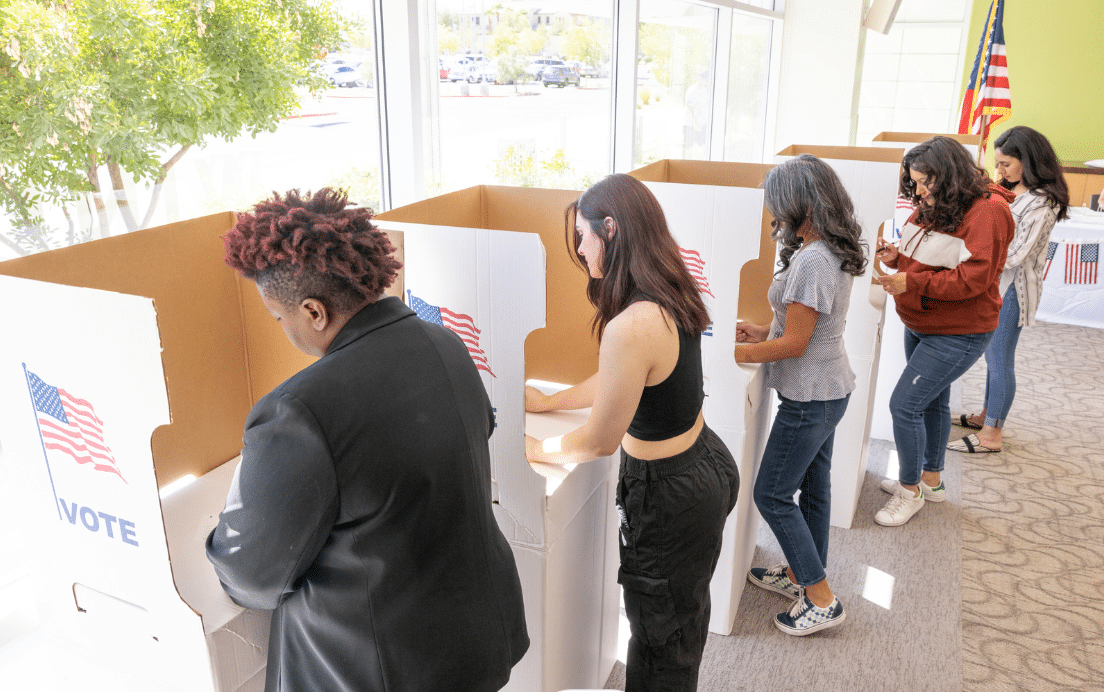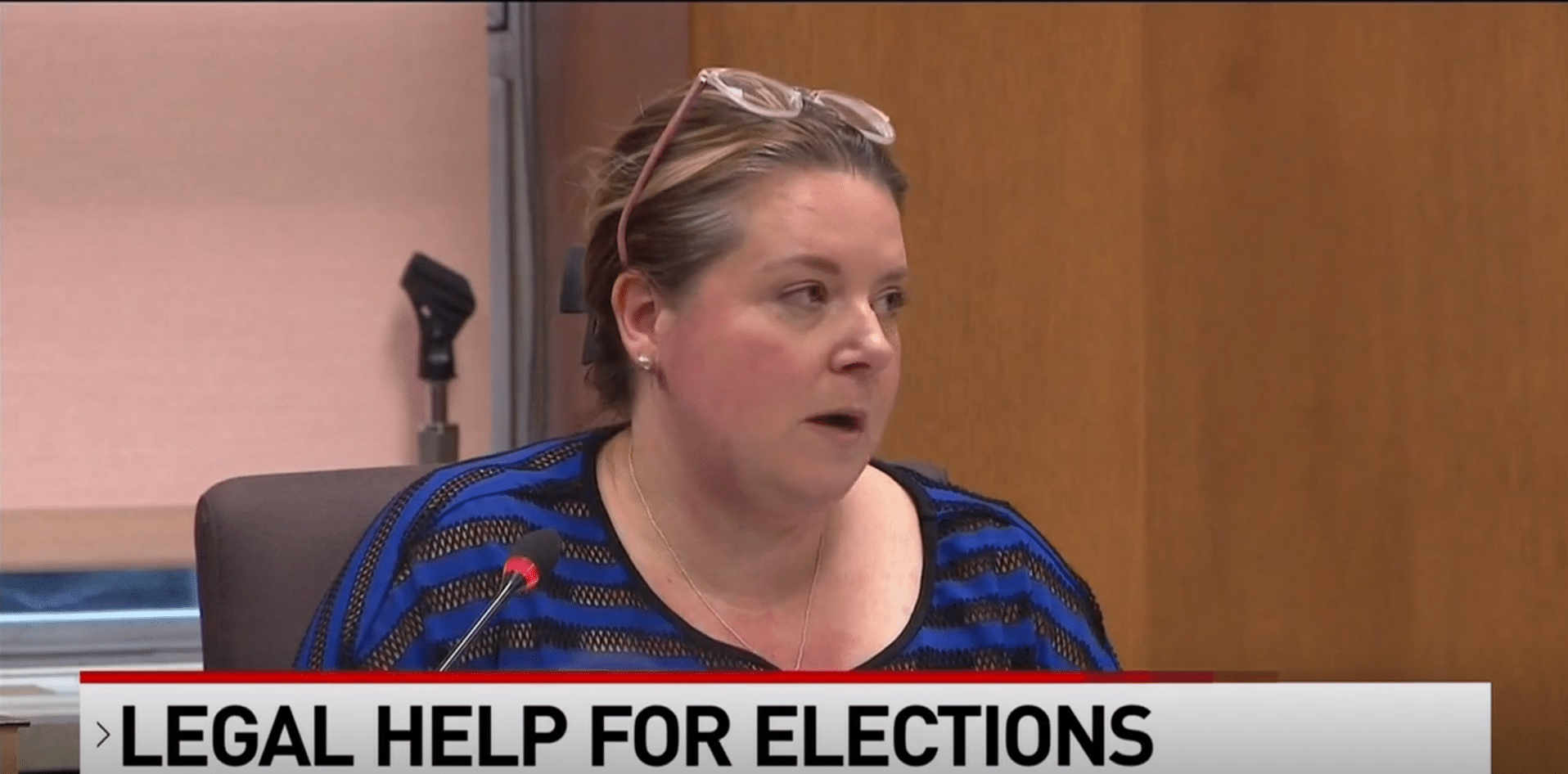Virginia Republicans Go Rogue, Adopt Ranked-Choice Voting on the Sly—With Activist Support
Activists at far-left FairVote have joined with Republican election officials to secretly scam Virginians. Ranked-choice voting is our future—unless conservatives rally to stop them.
Professional activists in D.C. and North Carolina are running a stealth campaign to foist ranked-choice voting on Virginians—and they’re getting help from Richmond’s Republican-run elections board.
In May, officials from the Elections Department and its oversight committee, the State Board of Elections, quietly revealed they were contracting with a little-known activist group to adopt ranked-choice voting (RCV) software for future elections—software developed by a FairVote spin-off with funding from powerful leftist mega-donors.
The move signals the state’s intent to soon implement RCV in all future elections—whether Virginians and lawmakers like it or not.
Putting the “Fix” In
If you’re unfamiliar with RCV, it’s the Left’s latest billionaire-backed “reform” project. Proponents claim the policy will lower election costs and improve trust in outcomes; in reality, it’s a convoluted scheme to rig elections against Republicans and make it easier for ideologues to meddle in election machinery.
For proof, look no further than Alaska’s outrageous upset in the 2022 midterms, when Democrat Mary Peltola defeated Sarah Palin for a Republican-held congressional seat. Observers chalk up Peltola’s victory to RCV, adopted in 2020 by state that voted 53-43 percent for Donald Trump that year and hasn’t elected a Democrat to the House of Representatives in 50 years.
“Ranked-choice voting makes voting harder and makes elections messier and more complicated, putting public confidence in elections at risk,” Honest Elections Project director Jason Snead told Restoration News. In 2020, Virginia’s Democrat-controlled General Assembly “decided to allow localities to use RCV for certain races, meaning voters will face an even more complicated ballot where some races use RCV and others do not.”
He continued:
Since RCV asks voters to rank multiple candidates in each election, voting takes longer. That risks long lines at the polls and puts an extra burden on voters, especially seniors and vulnerable voters. RCV elections depend on opaque algorithms to compute the results, making mistakes difficult to spot and greatly complicating audits and recounts.
In fact, a recent RCV election in California was so badly botched that the wrong winner was certified. It took four months and a lawsuit to resolve the issue, but RCV is so complicated that the mistake was nearly missed altogether. And RCV can lead to huge numbers of ballots being thrown out due to errors and ‘ballot exhaustion.’
“The right path forward would be for Virginia to restore consistency in its election laws by halting this unwise experiment in RCV,” Snead added.
“Unwise” is the operating word, as it may not prove as helpful to winning elections as some Democrats think. One day after the Virginia meeting the D.C. Democratic Party rejected implementing ranked-choice voting in the city because “District wards are not equal in terms of voter turnout . . . [RCV] could potentially undermine the democratic principles we strive to uphold.”
Party leaders maintain that RCV is an attempt to undermine the strength of Democrats in the city and could introduce covertly open primaries ‘that could undermine the rights of registered Democrats to choose their nominees for public office’ [emphasis added].
Nevertheless, “progressives” have seized upon RCV as the future in Oregon, Washington, Nevada, California, New Mexico, New York, Maine, Massachusetts, Minnesota, Maryland, Vermont—and most recently Arlington County, Virginia, where the all-Democrat electoral board greenlit a pilot program in December.
Bizarrely, Richmond Republicans apparently want to skip Arlington’s test phase altogether and go full-throttle on ranked-choice voting statewide. Why on Earth would they want that?

Par for the “Stupid Party”
The Department of Elections (ELECT) is firmly controlled by the Republicans under Commissioner Susan Beals, a Gov. Glenn Youngkin (R) appointee. So too is the State Board of Elections, the body that oversees ELECT and has a 4-1 GOP majority. (The exception is Matthew Weinstein, legal counsel to the Arlington County Democratic Committee and a now-former member of Arlington County Electoral Board present when RCV was adopted.)
There’s no political reason for Virginia Republicans to take their cues from the Left—and in fact strong reasons not to.
NPR and other “progressive” media outlets have screeched, howled, and growled about Youngkin’s takeover of election administration, pro-life beliefs, and “sharp turn to the right” for abolishing Critical Race Theory curricula. In February, Senate Democrats voted to oust a Youngkin appointee, Suparna Dutta—an immigrant mother who opposes affirmative action—from the State Board of Education in a baldly partisan power play.
They’re in it to win. So why are Republicans loading the gun aimed at their own heads? The smart money says, “Blame Activism, Inc.”
FairVote and the Professional Left
According to the State Board of Elections minutes (archived here), Virginia is plowing ahead with the adoption of Universal RCV Tabulator (RCTab) software “for the proper administration of elections determined by RCV.”
In other words, the Elections Department expects ranked-choice voting to soon be adopted statewide—and is buying the tools to put it into practice. From the document:
As ELECT [the Department of Elections] was in the process of building policies and procedures to conduct RCV contests throughout the state and evaluating available options for this software, it became imperative to procure the use of a standardized third-party tabulator.
That software was developed by the little-known Ranked Choice Voting Resource Center (RCVRC), which the minutes blandly describe as “a nonpartisan 501(c)(3) nonprofit organization.”
Far from it. The group’s official name in IRS disclosures is the Election Administration Resource Center, a spin-off of the “progressive” activist group FairVote created in August 2019 to encourage “the adoption, implementation, and impact of ranked-choice voting” and sway “election officials who traditionally have been distrustful of RCV.”


Recall that FairVote takes credit for enacting RCV in Arlington County with help from a few allies: the League of Women Voters; Veterans for Political Innovation, a Missouri RCV advocacy group; UpVote Virginia, a front for OneVirginia2021 Foundation, itself created to establish a California-style “independent” redistricting commission to draw the Commonwealth’s electoral maps; and RepresentUS, which lobbies for campaign finance restrictions.
Revealingly, RepresentUS pushes RCV legislation as part of a raft of policies to defeat Republican “election liars” and force (unconstitutional) donor disclosure laws. It also references RCVRC alongside Democracy Rising, a far-left activist training group that “partnered” with RCVRC to push ranked choice voting resources in the states.
FairVote has a long history of pushing the envelope on left-wing “reforms.” It was formed in Seattle 1992 as “Citizens for Proportional Representation” to turn Congress and state legislatures into UK-style parliaments (an idea even San Francisco voted down); then renamed a year later the “Center for Voting and Democracy;” then in 2004 to “FairVote.”
Along the way it’s supported automatic voter registration, federalizing elections, and instant-runoff voting (the predecessor to RCV), until landing on its two “reforms” du jour: Ranked-choice voting and eliminating the Electoral College. FairVote is one of the two big proponents of a National Popular Vote, an idea tailor-made to ensure no one trusts election outcomes ever again.
To hear these ideologues bray, one would think the world’s oldest democracy hasn’t held a free and fair election in 250 years. Yet RCV is gaining traction on the Left. In 2017, Rep. Don Beyer (D-Arlington)—the consultant class’ congressman–sponsored RCV legislation (H.R. 3057) for House races. (Recall that these proposals always begin with symbolic legislation.) And the Tides, Open Society, Hewlett, MacArthur, and Arnold Foundations have pumped money into FairVote for years to popularize the idea with Democrats.
But how would they reach Republicans?
Infiltrating Virginia
Enter the Ranked Choice Voting Resource Center (RCVRC), the group behind RCTab software. The center was launched in 2019 with $850,000 in seed capital from two funders: the lion’s share from the California-based William and Flora Hewlett Foundation (the philanthropy of Hewlett-Packard’s late co-founder), and a smaller bundle from the obscure Sheldon Kaphan Foundation, formed by Amazon’s first employee. In 2020, about half of RCVRC’s budget came from Hewlett, which earmarked another $1 million to the center in 2022. No conservative donors to the center have been identified.
We’ve also traced a $500,000 contribution to RCVRC from Arnold Ventures—likely delivered through Fidelity Charitable’s donor-advised fund—the philanthropy of ex-Enron billionaire John Arnold. Arnold Ventures is structured as an LLC, not a nonprofit, and so is exempt from filing IRS disclosures—the very definition of “dark money.”
Then there’s Unite America, a Colorado PAC that bankrolled New York City’s 2019 ballot initiative to adopt RCV with funding from Kathryn Murdoch, as well as smaller contributions from Jonathan Soros (son of George) and John Arnold. Unite America, which is led by Democrats, also supports “independent” redistricting commissions through its Voters First Project, one of the groups that lobbied Arlington County on RCV earlier this year. (Notably, Unite America was accused of violating Colorado’s campaign finance laws in 2018.)
Amazingly, the Unite America Institute tagged a 2021 grant to RCVRC for $250,000 to “support core grantee programmatic activities, including the jurisdiction support services program and the universal RCV tabulator (URVCT) project”—the software Virginia now aims to implement statewide.
RCVRC’s influence in North Carolina, a key battleground state, runs deep. Its executive director is Rosemary Blizzard, who served as Wayne County’s election director a decade ago (and helpfully lists her pronouns on LinkedIn). In March she succeeded RCVRC founder Gary Bartlett, a longtime North Carolina Elections Board director who happens to consult for FairVote.
Today the North Carolina Elections Board is led by another ex-RCVRC staffer: Karen Brinson-Bell, a member of the left-wing Bipartisan Policy Center’s Elections Task Force, which absurdly labels the 2020 election “the most secure in our nation’s history.”
Rebecca Chavez-Houck, a longtime Democrat in the Utah legislature who sponsored legislation in 2016 to create an “independent” redistricting commission, sits on the RCVRC board. She was a speaker at the March “Democracy Solutions Summit” for Represent Women—which, despite the name, exclusively featured left-wing luminaries like Amber McReynolds, founder of the mail-in ballot National Vote at Home Institute, and Colorado Sec. of State Jena Griswold, who recently railed against 150 Republican “election deniers” “desecrating the halls of Congress.”
We know that RCVRC “experts” were consulted when Portland, Oregon, adopted ranked-choice voting in April. One of them, RCVRC general counsel Chris Hughes, is a former FairVote staff attorney and ACLU intern. The other, Ryan Kirby, served as chief of staff to Maryland State Sen. Cheryl Kagan (D).
And RCVRC itself appears alongside FairVote as a collaborator with the Center for Civic Design, one of the key groups in the U.S. Alliance for Election Excellence, commonly called “Zuck bucks 2.0.” Earlier this year, the Honest Elections Project revealed the alliance’s plan to use $80 million from left-wing funders to buy influence in local election offices and insert its members into election processes.
Getting Away With Murder
This should be an easy victory for the Right. All that’s required is for our state election officials to cancel the contract… and swear off ranked-choice voting, period.
But there’s a larger question here. Why the sudden push for ranked-choice voting, anyway? As with other “reforms”—D.C. statehood, all-mail elections, ever-earlier voting—it’s the professional Left signaling that it no longer believes Democrats are competitive outside of a few “progressive” enclaves.
The ploy is obvious: When you’re losing the game, change the rules. The only question is, are conservatives suckers enough to fall for it?



